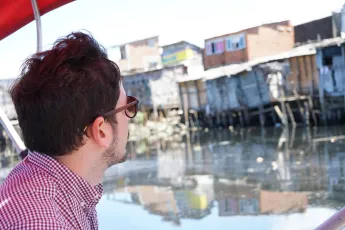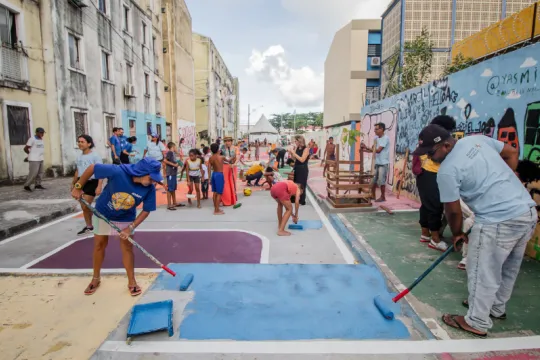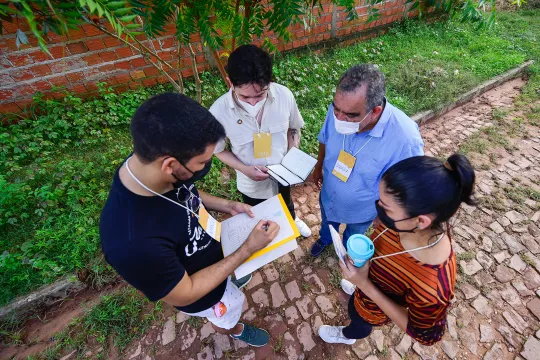
Lucas Turmena observing life along the river in Recife, Brazil © Arianna Flores Corral / UNU-EHS
Who: Lucas Turmena, Senior Research Associate – Zero-Carbon Trajectories at UNU-EHS
When: from 13 March to 01 April 2023
Where: Teresina and Recife, Brazil
What was the purpose of the field mission?
The main objective was to observe where we currently are in the transformation process on the ground in the cities of Teresina and Recife where two of the TUC Urban Labs are located. I interviewed Urban Lab members there. Doing so helps to track differences in mindsets, how people are working together and how they are building their networks and are coming up with innovative solutions. It also helps with project coordination, because we can see what works and what does not work on the ground, and adjust with the country teams accordingly. The first-hand experience with Urban Lab members adds an in-depth understanding to the data we already collected with the support of local researchers and ethnographers. I also attended some events while I was in Brazil, such as the launch event of the Carbon Emissions Inventory and the Climate Vulnerability Report of Teresina. In the same period, Recife launched a Plan for Sectoral Adaptation to Climate Change and a feasibility study for Social Housing, considering climate-related aspects. Both cities are very climate-vibrant.
That became exceptionally clear when I arrived to the Pilar Community to conduct interviews. People were actually demonstrating in the streets, blocking the road that provides access to the city hall. The main agenda was improving living conditions through social housing projects for those who currently live in informal and precarious shacks. Despite the protest, people were willing to talk to me, and I think it was actually quite a useful and valuable interaction for both them and me. I experienced first-hand how they framed their demands and to what extent they feel taken seriously by local authorities. It was a perfect example of how residents are emotionally engaged in the development of their neighbourhood and how much the recognition of marginalized voices is relevant to promote climate justice.
How are the Urban Labs progressing?
I participated in Urban Lab workshops in both cities to catch up with their progress. Both of them have established working groups on various topics that correspond to the needs of the neighbourhoods. For example, Recife has working groups on housing, waste management, a neighbourhood association to create multipurpose community spaces, as well as a working group that works on creating public spaces especially for children. In Teresina, the Urban Lab members participate in working groups on neighbourhood association, income generation, public spaces and public policy. The latter should help create access to public services for residents, such as closer health and day-care facilities to avoid long-haul travels across the city. The working group on income generation includes issues that connect employment and waste management or public space maintenance, for example. This does not only contribute to the overall quality of life of dwellers but also has systemic impacts on future local emissions, if job opportunities are offered closer to Edgar Gayoso. During the workshops, working groups presented their goals for the coming period, which allowed us to understand how to support them with data and research. Furthermore, Urban Lab participants are logically very focused on the work in their own neighbourhood. The project itself is international and has a broader scope. The workshops allowed me to show progress that is being made in the other cities and Urban Labs so participants do not have to reinvent the wheel but can learn from each other. This made attendees realize that their work is not only important for their own area, but can make a positive impact on a much larger scale.
To achieve their goals, Urban Labs need the support of local governments. The local partner, WRI Brasil, and I had strategic meetings with the mayor of Teresina and the deputy-mayor of Recife. We discussed the sustainability of project outcomes. For example, in Teresina the Urban Lab plans to build a multipurpose space. The local government committed to provide resources and a site where this space can be constructed, and considered how the maintenance of this new facility could be included in the municipal annual budget. It is important to already think of exit strategies for the project now, including the institutionalization of innovative measures, to ensure that the work that is being done is sustainable and will be maintained after the project ends, so that local development will remain ongoing.

